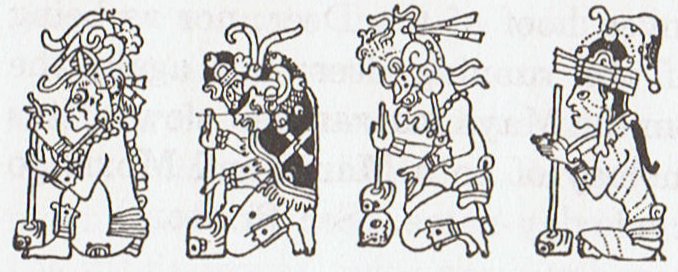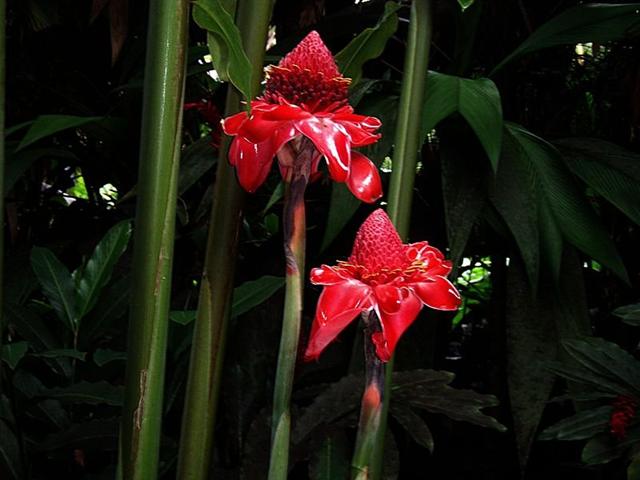On Easter Island Sun time
may have began anew with day 274
(Tagaroa Uri 1), because correctly
aligned stars and dates appear to point
at the 9th day beyond viri at the
spring equinox in Hora Nui 22.
265 (equinox) + 8 = 273 =
a completed old cycle of Sun light
measuring 3 * 91 days:

| |
|
Delta |
δ Andromedae |
8.4 |
March 29 (88) |
- |
- |
| |
|
|
η Phoenicis |
9.4 |
March 30 (89) |
- |
- |
|
0 |
- |
Zero |
η Andromedae |
11.4 |
April 1 (91) |
- |
0 |
| |
|
Whip |
Cih (γ Cassiopeiai) |
12.4 |
April 2 (92) |
- |
1 |
|
1 |
Al Sharatain |
Pair of Signs |
β Arietis (Sheratan),
γ (Mesarthim) |
27.4 |
April 17 (107) |
16 |
16 |
| |
|
Musca Borealis |
35 (Head of the Fly), 39
(Kaffaljidhma), and
41 Arietis (Bharani) |
41.4 |
May 1 (121) |
14 |
30 |
 |
 |
|
Ga5-10 |
Ga5-11 (121) |
|
Pßlida (184.6), Megrez
(184.9) |
Hasta-13 /
Chariot-28 |
|
GIENAH
(185.1), ε Muscae (185.2), ζ
Crucis (185.4), Zaniah
(185.9) |
|
Hora Nui 21 (*184) |
Equinox (265) |
|
║September 17 (*180) |
18 (261) |
|
'August 25 (237) |
26 (*158) |
|
"August 11 (*143) |
12 (224) |
|
Uttara Bhādrapadā-27
/
Wall-14 |
χ Pegasi (2.1), θ Andromedae
(2.7) |
|
ALGENIB PEGASI (1.8) |
|
Tarahao 22 (81 = 31 + 28 +
22) |
23 (448 = 366 + 82) |
|
║March 19 (78 = 443 - 365) |
20 (444 = 365 + 31 + 28 +
20) |
|
Bissextum (55 = *340
+ 80 - 365) |
'Feburary 25 (55 = 22 * 5 /
2) |
|
"February 10 (*326) |
11 (42 = *327 + 80 - 365) |
 |
 |
 |
 |
 |
|
Ga5-12 |
Ga5-13 |
Ga5-14 (124) |
Ga5-15 |
Ga5-16 |
|
Chang
Sha
(186.3) |
Intrometida (187.4), Acrux
(187.5) |
γ Com. Berenicis (188.0), σ
Centauri (188.1),
Algorab
(188.5), Gacrux (188.7)
|
γ Muscae (189.0),
Avis
Satyra
(189.3), Asterion (189.5),
Kraz
(189.7) |
α
Muscae (190.2), τ Centauri
(190.5), χ Virginis (190.7)
Alderamin
|
|
Hora Nui 23 |
24 |
25 (268) |
26 |
27 |
|
║Sept 19 |
20 |
21 (*184) |
Equinox |
23 (266) |
|
'August 27 |
28 (240) |
29 |
30 |
31 (*163) |
|
"August 13 |
14 |
15 (227) |
16 (*148) |
17 |
|
σ Andromedae (3.0), ζ
Tucanae (3.5), ρ Andromedae,
π Tucanae (3.7) |
no star listed (4) |
Ankaa, κ Phoenicis (5.0)
Alphard
|
λ Phoenicis (6.3), β Tucanae
(6.4) |
π Andromedae, Andromeda
Galaxy (7.7) |
|
Tarahao 24 |
25 (84) |
26 (451) |
27 (*372) |
28 |
|
Equinox (445) |
║March 22 (81) |
23 |
24 (*368) |
25 |
|
'Febr 26 (*342) |
27 |
28 (59) |
29 |
'March 1 |
|
"Febr 12 (408) |
13 |
14 (45) |
15 |
16 (*332) |
 |
 |
 |
|
Ga5-17 |
Ga5-18 (128) |
Ga5-19 |
|
Al ┴wwā'-11 |
ι Crucis (192.2), β Muscae
(192.5),
Mimosa
(192.9) |
no star listed (193) |
|
Sombrero Galaxy (191.1), ρ
Virginis (191.4),
PORRIMA,
γ Centauri (191.5) |
|
Hora Nui 28 |
29 |
30 (273) |
|
║September 24 (267) |
25 (*188) |
26 |
|
'September 1 (244) |
2 (*165) |
3 |
|
"August 18 (230) |
19 |
20 (*152) |
|
ε
Andromedae (8.2),
Delta
(8.4), Schedir (8.6), ζ
Andromedae, μ Phoenicis (8.9) |
ξ
Phoenicis (9.0), ρ Tucanae
(9.1), Deneb Kaitos,
η
Phoenicis (9.4) |
Achird (10.7) |
|
Tarahao 29 (454) |
30 |
31 (90) |
|
║March 26 (85) |
27 |
28 (*7) |
|
'March 2 (427) |
3 (*348) |
4
(64) |
|
"February 17 (413) |
18
(*334) |
19 (50) |
 |
 |
 |
 |
|
Ga5-20 (130) |
Ga5-21 |
Ga5-22 |
Ga5-23 |
|
κ Crucis (194.4), ψ Virginis
(194.5), μ Crucis, λ Crucis (194.6),
Alioth (194.8) |
Minelauva (195.1),
Cor Caroli
(195.3) |
δ Muscae (196.5), Vindemiatrix
(196.8) |
13h (197.8) |
|
ξ╣ Centauri (197.1), ξ▓ Centauri
(197.9) |
|
Tagaroa Uri 1 |
2 |
3 |
4 (277) |
|
║September 27 |
28 |
29 (*192) |
30 (273) |
|
'September
4 |
5 (*168) |
6 |
7 (250) |
|
"August 21 |
22 (*154) |
23 |
24 (236) |
|
Legs-15 |
Cih, λ
Tucanae (12.4), μ Andromedae (12.8) |
no star
listed (13) |
no star
listed (14) |
|
ν
Andromedae (11.0), ρ Phoenicis
(11.2), η
ANDROMEDAE (11.4) |
|
Vaitu Nui 1 (91) |
2 |
3 |
4 (460) |
|
║March 29 (*8) |
30 |
31 |
║April
1 (91) |
|
'March
5 (*350) |
6 |
7 (432) |
8 (68) |
|
"February
20 (*336) |
21 |
22 (418) |
23 (54) |
 |
 |
 |
 |
 |
|
Ga5-24 |
Ga5-25 |
Ga5-26 (136) |
Ga5-27 |
Ga5-28 |
|
Apami-Atsa, ψ Hydrae (198.5) |
Al Dafīrah (199.4) |
σ Virginis (200.4) |
γ Hydrae (201.0), ι Centauri
(201.4) |
Al Simāk-12 /
Chitra-14 /
Horn-1
ANA-ROTO |
|
Mizar (202.4),
SPICA,
Alcor (202.7)
Sadalmelik
|
|
Tagaroa Uri 5 |
6 |
7 (280) |
8 |
9 |
|
║October 1 |
2 (*195) |
3 |
4
(277) |
5 |
|
'September 8 |
9 (*172) |
10 |
11
(254) |
12 |
|
"August 25 (*157) |
26 |
27 |
28 (240) |
29 |
|
1h (15.2) |
Al Batn Al Hūt-26 /
Revati-28 |
ν
Phoenicis (17.4), κ Tucanae
(17.6) |
no
star listed (18) |
Adhil (19.3) |
|
β
Phoenicis (15.1), υ Phoenicis, ι
Tucanae (15.6), ζ Phoenicis
(15.7) |
MIRACH,
Keun Nan Mun (16.0), Anunitum
(16.5),
REVATI (16.9)
Regulus
|
|
Vaitu
Nui
5 |
6 |
7 |
8 (464) |
9 (99) |
|
║April 2 |
3 (*378) |
4
(459) |
5 |
6 (96) |
|
'March 9 |
10 (*355) |
11
(436) |
12 |
13 (73) |
|
"February
24 |
25
(*341) |
26 (422) |
27 |
28 (59) |
According to the calendar
of Julius Caesar - when read as
referring to star dates - Ga5-30
corresponded to nakshatra night 'March
15, i.e. to a position 360 nights after
the previous spring equinox.
Beyond this open henua
is the beginning of a new glyph line, and
nakshatra night 364 (= 4 * 91) counted
from the previous spring equinox
coincided with the position
where the Sun King was said to reach Easter
Island, i.e. in Tagaroa Uri 15:
 |
 |
 |
|
Ga6-3 |
Ga6-4 (144) |
Ga6-5 |
|
no star listed (207) |
τ Bootis (208.2),
Benetnash
(208.5), ν Centauri
(208.7), μ Centauri, υ
Bootis (208.8) |
no star listed (209) |
|
Tagaroa Uri 14 |
15 (288) |
16 |
|
║October 10 |
11 (*204) |
12 (285) |
|
'September
17 (260) |
18 |
19 (*182) |
|
"September 3 (246) |
4 |
5 (*168) |
|
no star listed (24) |
no star listed (25) |
ANA-NIA |
|
POLARIS,
Baten Kaitos (26.6),
Metallah (26.9) |
|
Vaitu Nui 14 |
15 |
16 (472) |
|
║April 11 (101) |
12 |
13 (468) |
|
'March 18 (78) |
19 (*364) |
20 (445) |
|
"March 4 (64) |
5 (*350) |
6 (431) |
Tangaroa Uri 15 was, it appears, defined from the very tip of the tail of Ursa Major, where Benetnash once had been visible close to the Full Moon at day 364 counted from the previous March equinox. RA day 208 + 183 = 391 = 364 + 27 (the precessional difference from Al Sharatain to rongorongo times).
"The canoes of Ava
Rei Pua and of Hotu were
seen near the (off-shore) islets. On
the fifteenth day of the month of
October (tangaroa uri)
the canoe of Hotu and the
canoe of Ava Rei Pua landed."
(The Eighth Island)
|
Pua
Pua.
1. A zingiberacea
(plant of which few
specimens are left on the
island). 2. Flower: pua
ti, ti flower, pua
taro, taro flower,
pua ma˙ku pasture
flower; pua nakonako,
a plant which grows on steep
slopes and produce red,
edible berries. 3. Pua
tariga (or perhaps
pu'a tariga), anciently,
hoops put in earlobes. 4.
The nanue fish when
young and tender. Puapua,
summit, top, upper part;
te puapua o te ma˙ga,
the top of the mountain;
te puapua kupega, the
upper part of a fishing net.
Vanaga.
Pu'a.
1. (Modern form of pu'o),
to cover up something or
oneself, to put on;
ka-pu'a te ha'u, put on
your hat; ka-pu'a-mai te
nua, cover me up with a
blanket. 2. To respond to
the song of the first group
of singers; to sing the
antistrophe; he-pu'a te
tai. 3. To help;
ka-pu'a toou rima ki a Timo
ite aga, help Timothy
with the work. 4.
Pu'a-hare, to help a
relative in war or in any
need; ka-oho,
ka-pu'a-hare korua, ko ga
kope, go, give your
relative a hand, lads. 5. To
speak out in someone's
favour; e pu'a-mai toou
re'o kia au, speak in my
favour, intercede for me.
Pu'apu'a, to hit, to
beat. Vanaga.
1. Flower,
ginger, soap; pua mouku,
grass. 2. To grease, to coat
with tar, to pitch; pua
ei meamea, to make
yellow. Puapua, a
piece of cloth. Mgv.: pua,
a flower, turmeric, starchy
matter of the turmeric and
hence soap. Mq.: pua,
a flower, soap. Ta.: pua,
id. Ma.: puapua,
cloth wrapped about the arm.
Churchill. |

|










